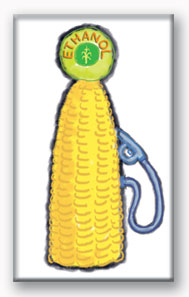Our agricultural priorities should be on filling hungry bellies, not fuel tanks.
The gloomy gus of economics, the Rev. Thomas Malthus, was the guy who put the dismal into the “dismal science,” predicting that the market in homo sapiens would periodically seek equilibrium through famine and widespread mayhem. Malthus didn’t foresee that humankind could innovate its way out of the 19th-century numbers game: more people+limited arable land=hunger and death. Our preindustrial ancestors eventually came up with a new food formula: more people+better agricultural technology=good eatin’.
It would seem, however, that Malthus may have the last laugh (mirthless and sinister though it might be). Food riots in Haiti and Africa, rice shortages in Asia, Sam’s Club quotas in America, and anxiety-inducing U.N. and World Bank pronouncements highlight an astonishing early 21st century extreme Malthusian makeover. Food prices are escalating beyond the pocketbooks of the poor, and spot shortages even in the industrialized world indicate a breakdown in the developed world’s capacity to maintain adequate food supplies. The World Food Program currently monitors a food crisis watch list of 30 nations and is seeking billions more from donors just to get through anticipated food crises this year.
Broadly speaking the price of wheat has doubled in less than a year, while other staples—corn, maize, and soy—trade well above 1990s levels. According to Catholic Relief Services (CRS), a 110-pound sack of wheat that cost about $8 two years ago in Egypt now costs $25. Rice, the staple food for about 3 billion people worldwide, has tripled in cost in the last 18 months. Lisa Kuennen-Asfaw, a CRS food policy analyst, says the world’s most vulnerable people are now making choices not only between food and fuel but between food and shelter. Poor families are going homeless in order to eat.
A number of large-scale structural and cultural changes have converged to stir up 2008’s food fight. World demand for basic commodities has skyrocketed as families in fast-emerging economies like China convert to a Westernized diet centered around grain-fed meat products. High oil prices drove up transport costs for food and commodities and spurred an abrupt lurch into alternative biofuels. About 30 percent of U.S. corn production in 2008 will be used for ethanol, according to the International Food Policy Research Institute in Washington. The coup de grace, perhaps permanently, on affordable food has been climate change. Drought in big agricultural nations such as Australia means diminished global rice supplies and increased costs on existing reserves.
Though the poor in developing economies, who traditionally commit the greatest percentage of their daily income to their daily bread, are already the casualties of the global food crunch, Kuennen-Asfaw is certain that rising costs have similarly hurt low-income people in the industrialized world. This slow-boil crisis may have so far gone less observed since folks in the West have a lot farther to fall, she says, even as most of us may be wondering why our wallets and cupboards are going bare earlier in the month than usual.
How best to respond? A real growth sector in terms of global food supply could actually be located in the epicenter of the crisis. Kuennen-Asfaw says 2008’s “sudden” food crisis is actually the result of years of underinvestment in agriculture in the developing world. While the developed world responds to the current food emergency, it must make a deeper commitment to a long-term solution that includes rebuilding capacity in the developing world and an immediate reappraisal of the West’s biofuels strategy.
“Aside from the moral dilemma of using food to make fuel,” Kuennen-Asfaw says, “using corn to make ethanol is terribly inefficient.” There are many other ways to reduce U.S. dependency on foreign oil and to better steward the environment, including—gulp—personal lifestyle choices directed toward conservation instead of consumption.
“There’s demand for [these commodities] that is not going to go away,” Kuennen-Asfaw says. “The corn is going to be consumed anyway, so why not let people eat?”














Add comment